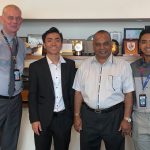The IMU’s School of Business and Technology brings together a unique combination of disciplines, i.e. business administration, healthcare management, and digital health technology. Prof Saravanan Muthaiyah, Dean of the School tells us more about this synergistic environment.
Healthcare is at the heart of our community and those on the frontline (i.e. doctors and nurses), continue to be the familiar patient-facing ambassadors of health. But there are also the unsung heroes who work behind the scenes, managing logistics and data, administrating protocols, and innovating new ways of bringing together the various components of the healthcare ecosystem. These are the health professionals trained in the intricacies of keeping health systems and infrastructure (the backbone of the healthcare industry), robust and solid.
At IMU’s School of Business and Technology (SOBT), students will gain the knowledge and expertise to be part of the backbone of the industry. “Our aim is to nurture the future leaders of healthcare,” says Prof Saravanan Muthaiyah, Dean of the SOBT, adding that the school will equip students with skills to navigate the evolving landscape of digital health and provide a clear path for a career in healthcare administration and healthcare entrepreneurship.
The Future is Digital
As one of the most fast-paced disciplines, technology has been transforming the medical arena in leaps and bounds and has brought significant impact on patient outcomes. Technology allows us to collect, share and manage health information; it helps predict diagnoses and personalise treatment protocols, and seamlessly bridges data from different sources to enable more precise healthcare delivery.
Keeping pace with the digital innovations that have accelerated healthcare delivery, the IMU has been running its Bachelor in Digital Health – the first degree in Malaysia that integrates ICT, data analytics and healthcare – since 2022. It offers students from both science and non-science backgrounds the opportunity to embark on health-related careers beyond the conventional IT degree.
As the school’s new Dean, Prof Saravanan hopes to drive the programme to even greater heights. “Technology shouldn’t just be seen as an enabling tool for healthcare,” he says, explaining that we often think about digital health as wearables and online platforms that increase access to healthcare. “It should go beyond that. Technology should be at the heart of how we solve real world healthcare-related problems,” he adds.
As an example of how technology can be fully utilised to push the boundaries of healthcare, Prof Saravanan cites a cancer research project he is currently working on. The project is focused on how genome sequencing technology can be used to map out personalised treatment for individuals. “What we want to achieve is customising medicine according to the patient’s body type. That’s where medicine is moving now because treatment cannot be homogeneous. It should be heterogeneous,” he says.
Keeping It Real
Students at the SOBT can look forward to exposure to and involvement in projects such as the above. Prof Saravanan explains that he hopes to cement collaborations with public hospitals which will allow the university to collect data and information that can be used as a base for students’ research projects. “Digital health sounds sexy but what problems are we solving? I want to provide the team with real world scenarios to apply that technology. We can then translate this into curriculum, internships and placements, mobility programmes and research projects,” says Prof Saravanan.
He hopes that with a focus on real world problems, students will continue to benefit from practical, industry-relevant learning. “This not only provides students with hands-on experience but also enhances their readiness for real-world challenges,” he says, explaining that the first step would be to ensure that the school’s mobility programmes, internships and research projects are able to align students with real problems and not just textbook scenarios. “We will get them to work on real world projects so that when they write their resumes, it will be a portfolio of work they have done and problems that they have solved – not just what they have learnt,” says Prof Saravanan.
Building the Business
As populations age all over the world, and people live longer, the need for healthcare becomes more crucial. Alongside digital health, the IMU’s Bachelor of Business Administration with Healthcare Management offers students a chance to carve a niche for themselves in the ever-growing healthcare space. “It brings together business management – a core and useful skill in any industry – and healthcare management,” says Prof Saravanan.
With the three disciplines under one roof, Prof Saravanan describes the SOBT as a dynamic hub of learning and innovation. “The school fosters an environment that empowers students and faculty alike,” he says, adding that his aim is for it to be a place where the best lecturers teach. “This includes retired lecturers who have the years of experience and we hope to attract faculty from other countries too,” says Prof Saravanan.
Additionally, mentorship programmes, guest lectures from industry experts, and continuous professional development opportunities will contribute to a holistic educational experience at the SOBT.
Executive Education in Healthcare
For Prof Saravanan, he sees an opportunity for the school to provide education to those who have been working for a long time but who never received qualifications. For example, the front desk worker at the clinic counter who may have SPM-level qualifications or a diploma in nursing but who has never had the opportunity to upskill formally. According to Prof Saravanan, this is an untapped and underserved community that deserves a space to develop: “We want to provide executive education to those individuals. Give them an opportunity to earn a paper qualification for the experience that they have.”
Executive education is also relevant to those who are already in healthcare, including doctors, who want to learn other aspects of the industry such as hospital administration, finance and marketing. “These may be doctors, who have experience in healthcare and medicine but don’t know how to manage a hospital,” says Prof Saravanan.
Problem Solvers of the World
“I want my students to have a critical mind and to be problem solvers in the real world,” says Prof Saravanan, explaining that at the SOBT, students will gain more than just a degree. He hopes that the university experience will instil a strong sense of adaptability in students and a passion for continuous learning as well as the ability to apply theoretical knowledge in practical contexts. “Furthermore, I seek to inculcate qualities such as effective communication, teamwork, and ethical decision-making,” he adds.
“These attributes are vital to equip students to stand out in their careers and contribute meaningfully to society,” says Prof Saravanan, challenging his students to be “graduates who are prepared to solve problems in the community.”
About Prof Saravanan
Prof Saravanan Muthaiyah, is a seasoned academic and technologist and possesses extensive expertise in Semantic Technology, Digital Transformation, Blockchain, Data Science, and FinTech. He studied accounting, started his career in audit and along the way pivoted into the world of technology and academia.
With 35 intellectual properties (IPs) to his credit, Prof Saravanan is an active researcher, exemplifying a commitment to advancing knowledge and innovation in the intersection of technology and business.
His most rewarding moment in his career has been to witness the transformative impact of education on his students’ lives. “It’s immensely gratifying when they start to embark on successful careers. Knowing that I’ve played a part in shaping their future and empowering them to reach their full potential is truly fulfilling,” he says.









